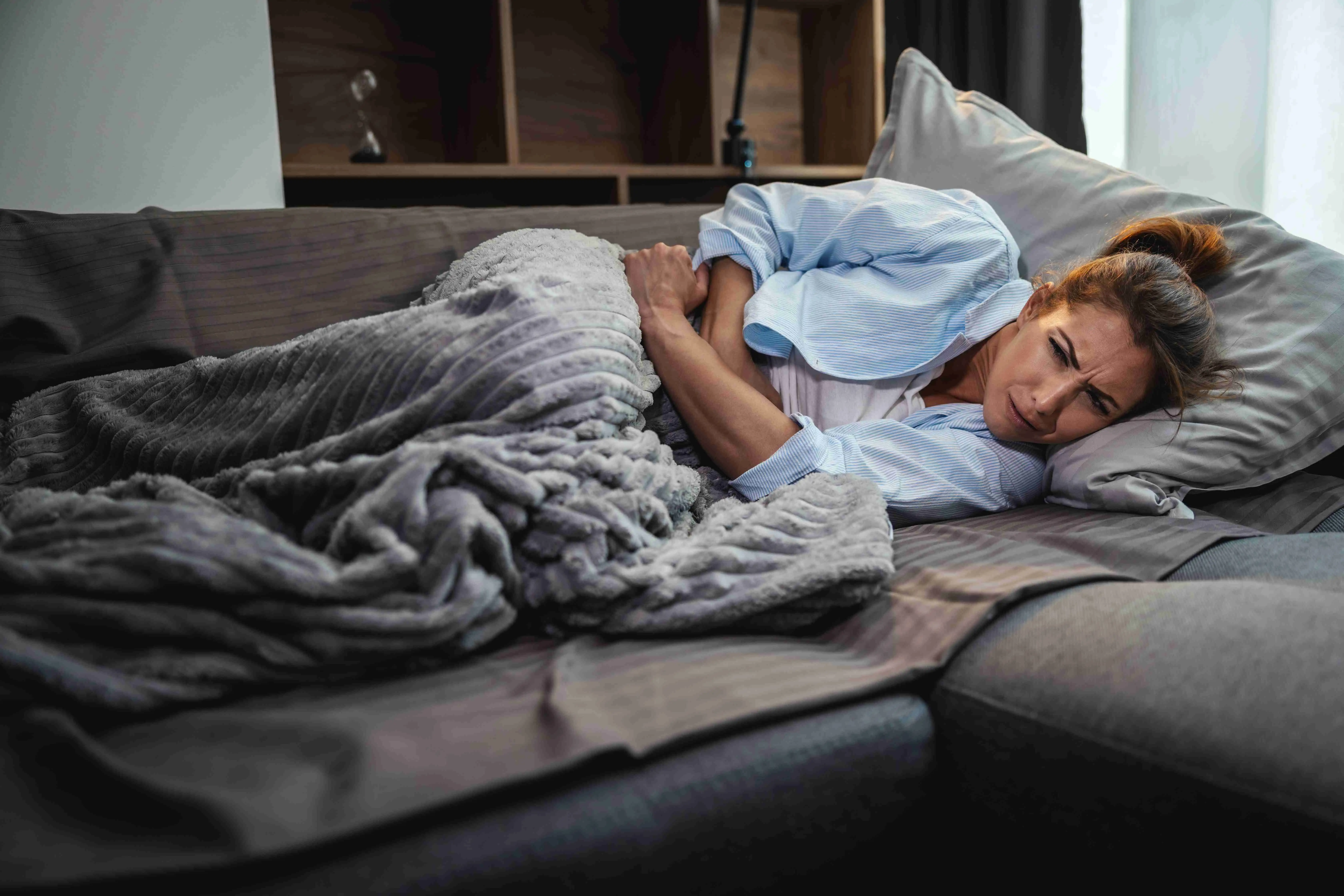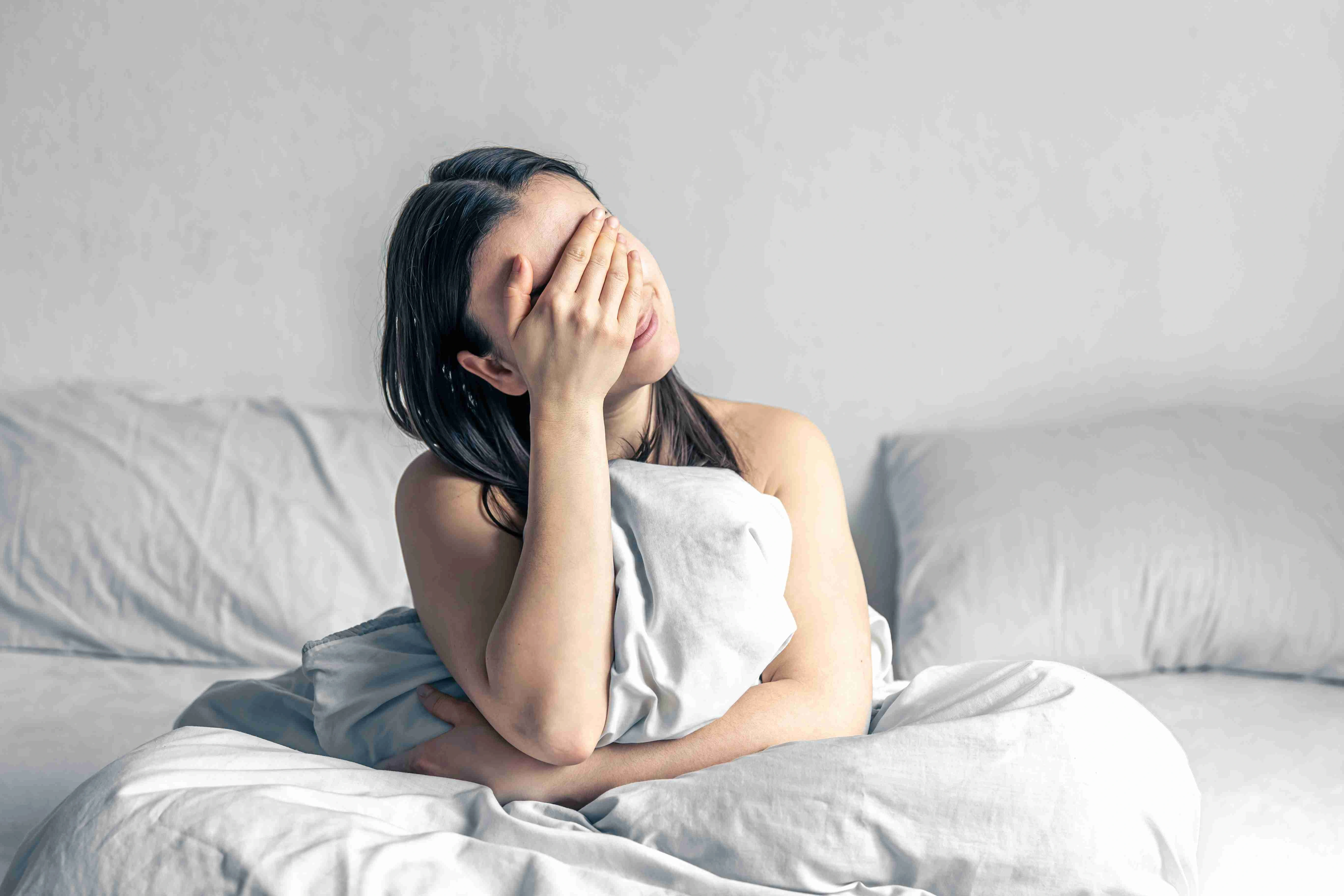PMS and period insomnia are common yet often overlooked challenges that many women face during their menstrual cycles. The fluctuations in hormones can significantly disrupt sleep patterns, leading to a host of symptoms that affect daily life.
This article explores the causes, symptoms, and impacts of PMS-related insomnia, as well as effective strategies for managing sleep disturbances during this time. By understanding the relationship between hormonal changes and sleep, women can better navigate these challenges and improve their overall well-being.
PMS/Period Insomnia Definition

PMS/period insomnia refers to the difficulty in falling or trouble falling asleep in the days leading up to or during your period. PMS/period insomnia is a real and frustrating condition that can significantly impact your daily life.
It's essential to understand the causes, symptoms, and effective remedies to manage this sleep disturbance and maintain a healthy, well-rested lifestyle.
Causes Of PMS/Period Insomnia
Several factors contribute to the development of PMS/period insomnia. Here are some of the most common causes:
- Hormonal Fluctuations: During the menstrual cycle, your body experiences significant hormonal changes. The rise and fall of estrogen and progesterone levels can disrupt your sleep patterns and make it challenging to achieve deep, restful sleep.
- Disrupted Circadian Rhythm: Hormonal shifts can also interfere with your body’s internal clock, or circadian rhythm, disrupting your sleep-wake cycle and leading to poor sleep quality during certain phases of your cycle.
- Physical Discomfort: Menstrual cramps, bloating, and other physical symptoms associated with PMS can make it difficult to find a comfortable position for sleep, leading to restlessness and interrupted sleep.
- Emotional Changes: The hormonal shifts during the menstrual cycle can also affect your emotional state. Mood swings, anxiety, and depression can all contribute to sleep disturbances.
- Body Temperature Fluctuations: Many women experience changes in body temperature during their menstrual cycle, which can interfere with the body's natural sleep-wake cycle and make it harder to fall or stay asleep.
Symptoms Of PMS/Period Insomnia

The symptoms of PMS/period insomnia can vary from woman to woman, but some common signs include:
Difficulty Falling Asleep
Many women experience trouble initiating sleep, known as sleep onset insomnia, often due to hormonal fluctuations, discomfort, or anxiety associated with their menstrual cycle.
Frequent Awakenings During the Night
Waking up multiple times during the night, or better known as sleep maintenance insomnia, disrupts sleep continuity, leading to feelings of unrest and fatigue the next day.
Restless/Non-Restorative Sleep
Even after a full night in bed, individuals may wake up feeling unrefreshed due to fragmented or poor-quality sleep.
Daytime Fatigue and Irritability
Insufficient rest can result in excessive daytime tiredness, affecting mood and overall energy levels, often leading to irritability.
Cognitive Issues
Impaired focus, memory lapses, and difficulty concentrating are common cognitive challenges linked to insomnia, making daily tasks more difficult.
Mood Changes
Hormonal shifts combined with sleep deprivation can exacerbate mood swings, anxiety, and emotional instability, impacting relationships and daily interactions.
Risk Factors For PMS-Related Insomnia
Risk factors for PMS-related insomnia include age, as hormonal fluctuations impact sleep; high-stress levels, which can exacerbate sleep disturbances; and heavy menstrual bleeding, leading to anxiety about leaks and discomfort. These factors can contribute to difficulties in achieving restful sleep during the menstrual cycle.
Age
Hormonal changes during puberty, menstruation, and perimenopause can heighten the likelihood of insomnia in women, making age a significant risk factor.
High Stress Levels
Increased stress, whether from work, personal relationships, or life changes, can worsen sleep quality, particularly during the menstrual cycle.
Heavy Periods and Anxiety About Leaks
Women experiencing heavy menstrual bleeding may have anxiety about leaks or discomfort, leading to restlessness and difficulty sleeping.
The Impact Of PMS/Period Insomnia On Daily Life

Insufficient sleep can have far-reaching consequences on your overall well-being and daily functioning. PMS/period insomnia can lead to:
Decreased Productivity And Work Performance
Lack of restful sleep can hinder focus and efficiency at work, leading to decreased productivity. Tasks may take longer to complete, and the quality of work can suffer.
Impaired Cognitive Function And Decision-Making Abilities
Sleep deprivation affects cognitive processes such as memory, attention, and problem-solving. This can result in poor decision-making and difficulty concentrating, impacting both personal and professional life.
Increased Risk Of Accidents Or Injuries Due To Fatigue
Fatigue from insomnia can heighten the risk of accidents, whether at work, while driving, or during daily activities. Drowsiness can slow reaction times and impair judgment, posing safety concerns.
Strained Relationships With Family And Friends
Mood disturbances and irritability stemming from trouble sleeping can strain relationships. Individuals may find themselves more easily frustrated or less patient, leading to conflicts with loved ones.
Exacerbation Of PMS Symptoms, Such As Mood Swings And Irritability
Insomnia can worsen the emotional and physical symptoms associated with PMS, amplifying mood swings, anxiety, and irritability. This cyclical effect can create a challenging environment for managing both sleep and menstrual symptoms.
Managing PMS/Period Insomnia

While PMS/period insomnia can be challenging, several effective remedies can help you manage your symptoms and improve your sleep quality.
Lifestyle Changes
- Establish A Consistent Sleep Routine: Maintain a regular sleep schedule by going to bed and waking up at the same time each day, even on weekends. This helps regulate your body's internal clock and promotes better sleep.
- Create A Sleep-Friendly Environment: Ensure your bedroom is cool, dark, and quiet. Use comfortable bedding and consider using blackout curtains or an eye mask to block out light.
- Practice Relaxation Techniques: Engage in relaxation practices like exercises, progressive muscle relaxation, or meditation before bedtime to calm your mind and body.
- Exercise Regularly: Regular physical activity can help reduce stress and promote better sleep. However, avoid intense workouts close to bedtime, as they can be stimulating.
Dietary Adjustments
- Limit Caffeine and Alcohol: Both caffeine and alcohol can disrupt your sleep patterns, so it's best to avoid them, especially in the afternoon and evening hours.
- Increase Magnesium Intake: Magnesium is a mineral that plays a crucial role in promoting relaxation and improving sleep quality. Incorporate magnesium-rich foods like spinach, pumpkin seeds, and dark chocolate into your diet.
- Stay Hydrated: Dehydration can exacerbate PMS symptoms, including cramps and headaches, which can further disrupt your sleep. Drink plenty of water throughout the day.
Natural Remedies
- Herbal Supplements: Some herbal supplements, such as valerian root, chamomile, and passionflower, have been traditionally used to promote relaxation and improve sleep quality.
- Essential Oils: Certain essential oils, like lavender and bergamot, are known for their calming and sleep-inducing properties. You can use them in a diffuser or add a few drops to your bath or pillow.
- Warm Baths: Taking a warm bath before bedtime can help relax your muscles and reduce stress, promoting better sleep. Consider adding Epsom salts or essential oils to enhance the relaxation experience.
Hormonal Contraceptives
Birth control pills or other hormonal contraceptives can help regulate hormonal fluctuations and reduce PMS symptoms, including insomnia.
Cognitive-Behavioral Therapy For Insomnia (CBT-I)
Cognitive-Behavioral Therapy for Insomnia (CBT-I) is an effective treatment for insomnia related to menstrual cycles or premenstrual syndrome (PMS). It focuses on identifying and changing negative thought patterns and behaviors that disrupt sleep.
Techniques include sleep education, relaxation strategies, and cognitive restructuring to address anxiety or stress linked to menstrual symptoms.
FAQs
Is PMS/period insomnia common?
Yes, PMS/period insomnia is a common issue that affects many women during their menstrual cycle. Hormonal fluctuations can disrupt sleep patterns, leading to difficulties falling or staying asleep. Additionally, symptoms like cramps and mood changes can further exacerbate insomnia during this time.
Can PMS/period insomnia be prevented?
While it's not always possible to prevent PMS/period insomnia entirely, adopting healthy lifestyle habits, managing stress, and seeking medical advice can help minimize its impact.
Can PMS/period insomnia be treated with over-the-Counter sleep aids?
While over-the-counter sleep aids may provide temporary relief, it's essential to consult with your healthcare provider before using them, as they can have side effects and may interact with other medications.
Can PMS/period insomnia lead to long-term sleep problems?
If left unmanaged, PMS/period insomnia can potentially contribute to the development of chronic insomnia or other sleep disorders. Seeking appropriate treatment and adopting healthy sleep habits can help prevent long-term issues.
Conclusion
PMS and period insomnia can profoundly affect both sleep quality and overall daily functioning. Recognizing the symptoms and risk factors associated with this condition is crucial for effective management.
By implementing lifestyle changes, stress-reduction techniques, and seeking professional support when needed, women can improve their sleep during their menstrual cycles.
Karen Barnard
Karen is a Human Movement Science expert and a certified sports nutrition and massage therapist. At Sleepiverse, she combines her passion for human movement science and sleep health to educate herself and her readers about healthier sleep. In addition to writing articles, Karen manages a fitness studio offering private training, athletic conditioning, and sports massage therapy. She focuses on providing people with a holistic environment for people to reach their health goals, often incorporating stretch therapy to promote mental tranquillity and help people improve their sleep.


